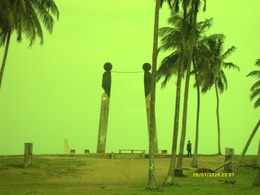Gberefu Island
This article needs additional citations for verification. (August 2020) |
Native name: Gberefu | |
|---|---|
 The two poles slightly slanted towards each other | |
| Geography | |
| Location | Close to Atlantic Ocean |
| Coordinates | 6°25′01″N 2°52′59″E / 6.417°N 2.883°E |
| Administration | |
| State | Lagos State |
| Local government area | Badagry |
| Demographics | |
| Ethnic groups | |
| Additional information | |
| Gberefu Island was opened as a slave port in 1473. | |
Gberefu Island also known as Point of No Return is a populated historical island located in Badagry, a town and local government area of Lagos State, South-Western Nigeria.[1] Symbolized by two poles slightly slanted towards each other and facing the Atlantic Ocean, the island was a major slave port after it was opened in 1473 during the Trans-Atlantic Slave Trade era.[2] According to Nigerian historians, as many as 3 million slaves were believed to have been shipped to the Caribbean and Americas between 1518 and 1880 from the island.[3]
People
[edit]GBEREFU ISLAND is headed by two chiefs, all crowned by the same Akran of Badagry Kingdom, and they are; I. Chief Yovoyan (The Duheto of Badagry Yovoyan/Gbragada) II. Chief Najeemu(late) (The Numeto of Badagry Gberefu). The Island's first settlers and real landlords are two Ewe communities (villages) under one umbrella, which are Gbragada, and Kofeganme (Yovoyan).
The Ewes of this Island were salt merchants and seasoned fishermen from Keta (The KETAS) around 1734, but majority of them are fishermen and farmers by occupation in the late 18th and early 19th century, although there are other ethnic groups living in the area, which comprises the Egun(Ogu)/Ilajes in one harmony with there landlords.
Etymology
[edit]Gberefu or Agbedefu- Gbe language principally in Ewe mesah- Life is trouble/difficult. .[4][5]
Tourism
[edit]
Since Gberefu Island is an historic site, it has attracted several tourists around the world thereby increasing its notability.[6] According to a 2015 statistics released on The Guardian, a total number of 3,634 people visited the island in 6 months.[7]
= Etymology =
Gbe languages principally Ewe. Corruption of Agbedefu :life is a struggle.
Gallery
[edit]Bibliography
[edit]- Africa Today. Afro Media. 2006.
- Hakeem Ibikunle Tijani (2010). The African diaspora: historical analysis, poetic verses, and pedagogy. Learning Solutions. ISBN 978-0-558-49759-0.
- Tigani E. Ibrahim; Babatope O. Ojo (1992). Badagry, past and present: Aholu-Menu-Toyi 1, Akran of Badagry, reign of peace. Ibro Communications Limited.
References
[edit]- ^ Abiose Adelaja (30 August 2014). "Badagry Slave Route faces environmental degradation". Premium Times. Retrieved 12 August 2015.
- ^ "Gberefu: Echoes of slaves' footsteps". The Nation. 30 August 2014. Retrieved 12 August 2015.
- ^ "Black Americans face slave legacy in Nigeria". News24. 30 May 2001. Retrieved 12 August 2015.
- ^ Jeremiah Madaki (7 July 2014). "Gberefu, the Island by 'The Point of No Return'". New Telegraph. Retrieved 12 August 2015.[permanent dead link]
- ^ "Upgrade Our Rural Community Pleads With Governor Sanwolu". P.M. News. 7 June 2011. Retrieved 12 August 2015.
- ^ Ada Igboanugo (11 August 2002). "Badagry Beach…And Beyond the 'Point of Return'". Thisday. Archived from the original on 13 September 2015. Retrieved 12 August 2015.
- ^ News Agency of Nigeria (6 July 2015). "3,634 tourists visit Point-of-No-Return Island in 6 months — Official". The Guardian. Retrieved 12 August 2015.








